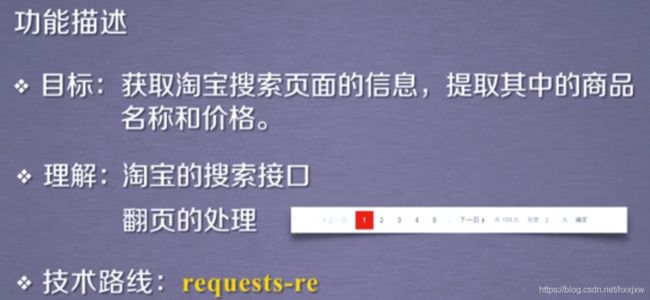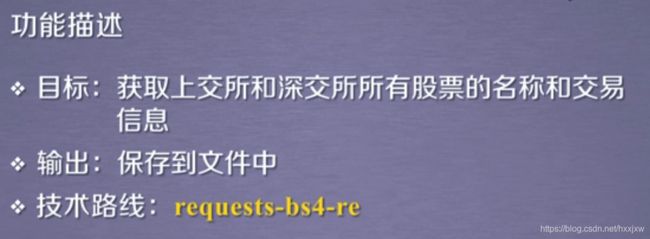- 利用Beautiful Soup和Pandas进行网页数据抓取与清洗处理实战
傻啦嘿哟
pandas
目录一、准备工作二、抓取网页数据三、数据清洗四、数据处理五、保存数据六、完整代码示例七、总结在数据分析和机器学习的项目中,数据的获取、清洗和处理是非常关键的步骤。今天,我们将通过一个实战案例,演示如何利用Python中的BeautifulSoup库进行网页数据抓取,并使用Pandas库进行数据清洗和处理。这个案例不仅适合初学者,也能帮助有一定经验的朋友快速掌握这两个强大的工具。一、准备工作在开始之
- python做一个注册界面_python如何做一个登录注册界面
weixin_39824033
python做一个注册界面
python做一个登录注册界面的方法:首先初始化一个window界面,并使用画布实现欢迎的logo;然后用代码实现登录和注册按钮;接着并进行登录判断代码;最后完成注册界面即可。【相关学习推荐:python视频教程】python做一个登录注册界面的方法:一、登录界面1、首先初始化一个window界面window=tk.Tk()window.title('WelcometoMofanPython')w
- python读取zip包内文件_Python模块学习:zipfile zip文件操作
weixin_40001634
python读取zip包内文件
最近在写一个网络客户端下载程序,用于下载服务器上的数据。有些数据(如文本,office文档)如果直接传输的话,将会增加通信的数据量,使下载时间变长。服务器在传输这些数据之前先对其进行压缩,客户端接收到数据之后进行解压,这样可以减小网通传输数据的通信量,缩短下载的时间,从而增加客户体验。以前用C#做类似应用程序的时候,我会用SharpZipLib这个开源组件,现在用Python做类似的工作,只要使用
- python制作登陆窗口_python登陆界面
weixin_39758494
python制作登陆窗口
广告关闭腾讯云11.11云上盛惠,精选热门产品助力上云,云服务器首年88元起,买的越多返的越多,最高返5000元!print(账号密码错误!请重试。)returnfalsebutton(master,text=登陆,width=10,command=test).grid(row=3,column=0,sticky=w,padx=10,pady=5)button(master,text=退出,wid
- 如何使用零配置的Sphinx生成Python文档?
潮易
sphinx全文检索搜索引擎
如何使用零配置的Sphinx生成Python文档?在Python编程中,编写文档是非常重要的。一个好的文档可以帮助其他开发者理解和使用你的代码。Sphinx是一个用于生成Python项目的文档的静态网页生成器,它支持多种文档格式,包括ReStructuredText和Markdown。以下是使用零配置的方式来使用Sphinx生成Python文档的详细步骤:1.首先,确保你已经安装了Sphinx。打
- 如何订阅&q;/扫描&q;主题、修改消息并发布到新主题?
潮易
python开发语言
如何订阅&q;/扫描&q;主题、修改消息并发布到新主题?这个问题涉及到Python编程中的MQTT(MessageQueuingTelemetryTransport)库的使用,该库允许我们创建客户端订阅和发布消息到MQTT服务器。以下是一个简单的步骤:1.安装MQTT库:可以使用pip安装`paho-mqtt`库。```pythonpipinstallpaho-mqtt```2.创建一个MQTT客
- Python-tkinter自制登录界面(含注册)
GCHEK
python开发语言
简单的用户登录、注册界面importtkinterastkimporttimeimportsubprocessimportsysimportosimporttkinter.messageboxwindow=tk.Tk()window.title('GCHEK')window.geometry('400x300')#设置储存用户信息的容器,这里用的txt。ifnotos.path.exists('U
- Python爬虫requests(详细)
dme.
Python爬虫零基础入门爬虫python
本文来学爬虫使用requests模块的常见操作。1.URL参数无论是在发送GET/POST请求时,网址URL都可能会携带参数,例如:http://www.5xclass.cn?age=19&name=dengres=requests.get(url="https://www.5xclass.cn?age=19&name=deng")res=requests.get(url="https://www
- 使用python计算等比数列求和的方法
HAMYHF
windows
在python中,计算Sum=m+mm+mmm+mmmm+.....+mmmmm.....,输入两个数m,n。m的位数累加到n的值,列出算式并计算出结果:#为了打印出算式,并计算出结果,将m,mm这些放入到列表中#定义列表中的m初始值为0,用Ele来代表m,mm....Ele=0#定义总和为0Sum=0#定义一个空列表List=[]#输入两个值n=int(input("inputadigit:")
- Python+Playwright常用元素定位方法
HAMYHF
python功能测试
CSSselector选择器在CSS中,定位元素主要通过选择器完成,以下是几种常见的CSS选择器定位方法:标签选择器(element):直接使用HTML元素名称来定位,例如p会选择所有段落元素。属性选择器(attribute):选择所有具有指定属性的元素,无论该属性的值是什么。例如,[title]会选择所有包含title属性的元素。选择具有指定属性,并且该属性值完全等于给定值的元素。例如,[typ
- Python中的 redis keyspace 通知_python 操作redis psubscribe(‘__keyspace@0__ ‘)
2301_82243733
程序员python学习面试
最后Python崛起并且风靡,因为优点多、应用领域广、被大牛们认可。学习Python门槛很低,但它的晋级路线很多,通过它你能进入机器学习、数据挖掘、大数据,CS等更加高级的领域。Python可以做网络应用,可以做科学计算,数据分析,可以做网络爬虫,可以做机器学习、自然语言处理、可以写游戏、可以做桌面应用…Python可以做的很多,你需要学好基础,再选择明确的方向。这里给大家分享一份全套的Pytho
- Python数据分析与可视化
程序媛小果
pythonpython数据分析开发语言
Python数据分析与可视化在数据驱动的商业世界中,数据分析和可视化成为了理解复杂数据集、做出明智决策的关键工具。Python,作为一种功能强大且易于学习的编程语言,提供了丰富的库和框架,使得数据分析和可视化变得简单高效。本文将探讨Python在数据分析和可视化中的应用,包括数据预处理、分析、以及如何通过可视化工具将数据洞察转化为可操作的策略。1.数据分析的重要性数据分析是提取数据中有用信息的过程
- 【Python 学习 / 7】模块与文件操作
卜及中
Python基础python学习数据库
文章目录前言一、导入模块1.导入整个模块2.导入模块中的特定函数3.给模块或函数起别名二、常用模块1.`math`模块2.`random`模块3.`os`模块4.`sys`模块三、文件处理1.打开文件2.读取文件3.写入文件4.关闭文件5.使用`with`语句管理文件四、日期时间1.`datetime`模块获取当前日期和时间创建日期和时间对象格式化日期和时间解析字符串为日期对象2.`time`模块
- 经销商管理系统架构设计方案(附 Java版本和Python版本源代码详解)
AI天才研究院
DeepSeekR1&大数据AI人工智能大模型AI大模型企业级应用开发实战AI大模型应用入门实战与进阶计算科学神经计算深度学习神经网络大数据人工智能大型语言模型AIAGILLMJavaPython架构设计AgentRPA
经销商管理系统架构设计方案(Java实现源代码详解)关键词:经销商管理系统,Java,SpringBoot,MyBatis,MySQL,架构设计,源代码1.背景介绍随着市场竞争的日益激烈,企业对经销商的管理越来越重视。传统的经销商管理方式效率低下,信息滞后,难以适应现代企业的发展需求。为了提高经销商管理效率,降低运营成本,越来越多的企业开始采用信息化的手段来管理经销商,而经销商管理系统应运而生。经
- Python:数据从Excel表格链接到Word文档 更新Excel即可自动更新Word
一个花生米生花
pythonexcelword
要使用Python来创建或更新一个Word文档,并将数据从Excel表格链接到Word文档中,你可以使用python-docx库来操作Word文档和openpyxl或pandas库来读取Excel文件。不过,需要注意的是,python-docx库并不支持将外部文件链接到Word文档的功能。你可以在Word文档中插入Excel数据的快照,但它们不会自动更新。如果你想要在Word文档中插入Excel数
- 使用Odoo Shell卸载模块
odoo中国
odooodoo开源软件erp
使用OdooShell卸载模块我们在Odoo使用过程中,因为模块安装错误或者前端错误等导致odoo无法通过界面登录,这时候你可以使用OdooShell来卸载模块。OdooShell是一个交互式Pythonshell,允许你直接与Odoo数据库和模型进行交互。以下是使用OdooShell卸载模块的详细步骤:步骤1:启动OdooShell要启动OdooShell,你需要在终端中运行以下命令。确保你已经
- NumPy的基本使用
Mo思
编程学习numpypython开发语言pip
在Python的数据科学与数值计算领域,NumPy无疑是一颗耀眼的明星。作为Python中用于科学计算的基础库,NumPy提供了高效的多维数组对象以及处理这些数组的各种工具。本文将带您深入了解NumPy的基本使用,感受它的强大魅力。一、安装与导入在使用NumPy之前,首先要确保它已经安装在您的Python环境中。如果您使用的是Anaconda发行版,NumPy通常已经预装。若未安装,可以使用如下命
- FOKS-TROT: 一个高效、易用的全功能开源知识图谱生成工具
柳旖岭
FOKS-TROT:一个高效、易用的全功能开源知识图谱生成工具项目简介FOKS-TROT是一个基于Python的全功能开源知识图谱生成工具,旨在帮助研究人员和开发者快速构建具有丰富信息的知识图谱。该项目由hkx3upper在GitCode上开发并维护。通过FOKS-TROT,您可以轻松地将各种数据源(如文本文件、数据库、API)转换为结构化的知识图谱,并对其进行可视化分析和机器学习任务。此外,该工
- python实现word文档合并 v2.0
task138
python自动化python自动化运维开发
目录前言要求运行效果脚本下载链接前言之前发表了一个小工具,python用于合并word文档以完成特定的工作任务,现在领导给出了新需求,适当的调整了一下word文档的合并情况。同时,各位同事反馈说,环境部署太难了,脚本的使用成本比较高,难度大,所以我这次把脚本打包成一个EXE可执行文件,直接双击即可使用。要求由于脚本的具体逻辑发生了变化,因此,exe文件的同级目录下,一定要存在一个txt文件,否则无
- 2025年全国CTF夺旗赛-从零基础入门到竞赛,看这一篇就稳了!
白帽安全-黑客4148
安全web安全网络网络安全CTF
目录一、CTF简介二、CTF竞赛模式三、CTF各大题型简介四、CTF学习路线4.1、初期1、html+css+js(2-3天)2、apache+php(4-5天)3、mysql(2-3天)4、python(2-3天)5、burpsuite(1-2天)4.2、中期1、SQL注入(7-8天)2、文件上传(7-8天)3、其他漏洞(14-15天)4.3、后期五、CTF学习资源5.1、CTF赛题复现平台5.
- 2025年全国CTF夺旗赛-从零基础入门到竞赛,看这一篇就稳了!
白帽安全-黑客4148
网络安全web安全linux密码学CTF
目录一、CTF简介二、CTF竞赛模式三、CTF各大题型简介四、CTF学习路线4.1、初期1、html+css+js(2-3天)2、apache+php(4-5天)3、mysql(2-3天)4、python(2-3天)5、burpsuite(1-2天)4.2、中期1、SQL注入(7-8天)2、文件上传(7-8天)3、其他漏洞(14-15天)4.3、后期五、CTF学习资源5.1、CTF赛题复现平台5.
- 基于python深度学习遥感影像地物分类与目标识别、分割实践技术应用
xiao5kou4chang6kai4
深度学习遥感勘测python深度学习分类
专题一:深度学习发展与机器学习深度学习的历史发展过程机器学习,深度学习等任务的基本处理流程梯度下降算法讲解不同初始化,学习率对梯度下降算法的实例分析从机器学习到深度学习算法专题二深度卷积网络、卷积神经网络、卷积运算的基本原理池化操作,全连接层,以及分类器的作用BP反向传播算法的理解一个简单CNN模型代码理解特征图,卷积核可视化分析专题三TensorFlow与keras介绍与入门TensorFlow
- python 快速实现链接转 word 文档
嘿嘿潶黑黑
pythonword
python快速实现链接转word文档演示代码展示最后演示代码展示fromnewspaperimportArticlefromdocximportDocumentfromdocx.sharedimportPt,RGBColorfromdocx.enum.styleimportWD_STYLE_TYPEfromdocx.oxml.nsimportqn#tkinterGUIimporttkintera
- Python入门笔记
「已注销」
计算机
文章目录第0周课程导学第1周Python基本语法元素保留字数据类型语句与函数输入函数第2周Python基本图形绘制turtle库绝对坐标海龟坐标turtle角度坐标体系RGB色彩体系画笔控制函数运动控制函数方向控制函数循环语句第3周基本数据类型整型浮点数科学计数法复数类型数值运算操作符二元操作符有对应的增强赋值操作符数值运算函数字符串类型的表示字符串切片字符串类型及操作字符串类型格式化time库时
- pythonxml模块高级用法_Python minidom模块用法示例【DOM写入和解析XML】
Lucy-露西娅
pythonxml模块高级用法
本文实例讲述了Pythonminidom模块用法。分享给大家供大家参考,具体如下:一、DOM写XML文件#-*-coding:utf-8-*-#!python3#导入minidomfromxml.domimportminidom#1.创建DOM树对象dom=minidom.Document()#2.创建根节点。每次都要用DOM对象来创建任何节点。root_node=dom.createElemen
- React 渲染 Flash 接口数据
ox0080
#北漂+滴滴出行VIP激励Webreact.js前端前端框架
1.后端Python代码使用Flask创建多个接口,每个接口返回不同的数据,并使用自定义装饰器来绑定路由。代码:#app.pyfromflaskimportFlask,jsonifyapp=Flask(__name__)defapi_route(route,methods=['GET']):"""自定义装饰器,用于将函数与HTTP路由绑定"""defdecorator(func):app.rout
- LQB---基础练习---十六进制转八进制
「已注销」
#LQBLQB
试题基础练习十六进制转八进制资源限制内存限制:512.0MBC/C++时间限制:1.0sJava时间限制:3.0sPython时间限制:5.0s问题描述给定n个十六进制正整数,输出它们对应的八进制数。输入格式输入的第一行为一个正整数n(1<=n<=10)。接下来n行,每行一个由09、大写字母AF组成的字符串,表示要转换的十六进制正整数,每个十六进制数长度不超过100000。输出格式输出n行,每行为
- 【2025年】全国CTF夺旗赛-从零基础入门到竞赛,看这一篇就稳了!
网安詹姆斯
web安全CTF网络安全大赛pythonlinux
【2025年】全国CTF夺旗赛-从零基础入门到竞赛,看这一篇就稳了!基于入门网络安全/黑客打造的:黑客&网络安全入门&进阶学习资源包目录一、CTF简介二、CTF竞赛模式三、CTF各大题型简介四、CTF学习路线4.1、初期1、html+css+js(2-3天)2、apache+php(4-5天)3、mysql(2-3天)4、python(2-3天)5、burpsuite(1-2天)4.2、中期1、S
- 机器学习·文本数据读写处理
AAA顶置摸鱼
python深度学习机器学习人工智能数据处理
前言在自然语言处理的第一步,需要面对的是各种各样以不同形式表现的文本数据,比如,txt、Excel中的表格数据,还有无法直接打开的pkl文件等。针对这些不同类型的数据,可以基于Python中的基本功能函数或者调用某些库进行读写以及作一些基本的处理。一、文本数据读写方法1.读写TXT文件读取方法:read():读取整个文件,返回字符串。readline():逐行读取,返回字符串。readlines(
- LQB(4)-python-DFS搜索
AAA顶置摸鱼
蓝桥杯python组深度优先算法python蓝桥杯
前言DFS即深度优先搜索(Depth-FirstSearch),是一种用于遍历或搜索树或图的算法,有三种核心的应用场景(基础遍历、回溯、剪枝)。一、DFS-基础遍历1.核心原理深度优先搜索(DFS)是一种遍历或搜索树/图的算法,优先沿着一条路径尽可能深入,直到无法继续再回溯。实现方式:递归:隐式利用系统调用栈。栈模拟:显式使用栈数据结构。2.代码实现(1)递归实现(树结构)classTreeNod
- scala的option和some
矮蛋蛋
编程scala
原文地址:
http://blog.sina.com.cn/s/blog_68af3f090100qkt8.html
对于学习 Scala 的 Java™ 开发人员来说,对象是一个比较自然、简单的入口点。在 本系列 前几期文章中,我介绍了 Scala 中一些面向对象的编程方法,这些方法实际上与 Java 编程的区别不是很大。我还向您展示了 Scala 如何重新应用传统的面向对象概念,找到其缺点
- NullPointerException
Cb123456
androidBaseAdapter
java.lang.NullPointerException: Attempt to invoke virtual method 'int android.view.View.getImportantForAccessibility()' on a null object reference
出现以上异常.然后就在baidu上
- PHP使用文件和目录
天子之骄
php文件和目录读取和写入php验证文件php锁定文件
PHP使用文件和目录
1.使用include()包含文件
(1):使用include()从一个被包含文档返回一个值
(2):在控制结构中使用include()
include_once()函数需要一个包含文件的路径,此外,第一次调用它的情况和include()一样,如果在脚本执行中再次对同一个文件调用,那么这个文件不会再次包含。
在php.ini文件中设置
- SQL SELECT DISTINCT 语句
何必如此
sql
SELECT DISTINCT 语句用于返回唯一不同的值。
SQL SELECT DISTINCT 语句
在表中,一个列可能会包含多个重复值,有时您也许希望仅仅列出不同(distinct)的值。
DISTINCT 关键词用于返回唯一不同的值。
SQL SELECT DISTINCT 语法
SELECT DISTINCT column_name,column_name
F
- java冒泡排序
3213213333332132
java冒泡排序
package com.algorithm;
/**
* @Description 冒泡
* @author FuJianyong
* 2015-1-22上午09:58:39
*/
public class MaoPao {
public static void main(String[] args) {
int[] mao = {17,50,26,18,9,10
- struts2.18 +json,struts2-json-plugin-2.1.8.1.jar配置及问题!
7454103
DAOspringAjaxjsonqq
struts2.18 出来有段时间了! (貌似是 稳定版)
闲时研究下下! 貌似 sruts2 搭配 json 做 ajax 很吃香!
实践了下下! 不当之处请绕过! 呵呵
网上一大堆 struts2+json 不过大多的json 插件 都是 jsonplugin.34.jar
strut
- struts2 数据标签说明
darkranger
jspbeanstrutsservletScheme
数据标签主要用于提供各种数据访问相关的功能,包括显示一个Action里的属性,以及生成国际化输出等功能
数据标签主要包括:
action :该标签用于在JSP页面中直接调用一个Action,通过指定executeResult参数,还可将该Action的处理结果包含到本页面来。
bean :该标签用于创建一个javabean实例。如果指定了id属性,则可以将创建的javabean实例放入Sta
- 链表.简单的链表节点构建
aijuans
编程技巧
/*编程环境WIN-TC*/ #include "stdio.h" #include "conio.h"
#define NODE(name, key_word, help) \ Node name[1]={{NULL, NULL, NULL, key_word, help}}
typedef struct node { &nbs
- tomcat下jndi的三种配置方式
avords
tomcat
jndi(Java Naming and Directory Interface,Java命名和目录接口)是一组在Java应用中访问命名和目录服务的API。命名服务将名称和对象联系起来,使得我们可以用名称
访问对象。目录服务是一种命名服务,在这种服务里,对象不但有名称,还有属性。
tomcat配置
- 关于敏捷的一些想法
houxinyou
敏捷
从网上看到这样一句话:“敏捷开发的最重要目标就是:满足用户多变的需求,说白了就是最大程度的让客户满意。”
感觉表达的不太清楚。
感觉容易被人误解的地方主要在“用户多变的需求”上。
第一种多变,实际上就是没有从根本上了解了用户的需求。用户的需求实际是稳定的,只是比较多,也比较混乱,用户一般只能了解自己的那一小部分,所以没有用户能清楚的表达出整体需求。而由于各种条件的,用户表达自己那一部分时也有
- 富养还是穷养,决定孩子的一生
bijian1013
教育人生
是什么决定孩子未来物质能否丰盛?为什么说寒门很难出贵子,三代才能出贵族?真的是父母必须有钱,才能大概率保证孩子未来富有吗?-----作者:@李雪爱与自由
事实并非由物质决定,而是由心灵决定。一朋友富有而且修养气质很好,兄弟姐妹也都如此。她的童年时代,物质上大家都很贫乏,但妈妈总是保持生活中的美感,时不时给孩子们带回一些美好小玩意,从来不对孩子传递生活艰辛、金钱来之不易、要懂得珍惜
- oracle 日期时间格式转化
征客丶
oracle
oracle 系统时间有 SYSDATE 与 SYSTIMESTAMP;
SYSDATE:不支持毫秒,取的是系统时间;
SYSTIMESTAMP:支持毫秒,日期,时间是给时区转换的,秒和毫秒是取的系统的。
日期转字符窜:
一、不取毫秒:
TO_CHAR(SYSDATE, 'YYYY-MM-DD HH24:MI:SS')
简要说明,
YYYY 年
MM 月
- 【Scala六】分析Spark源代码总结的Scala语法四
bit1129
scala
1. apply语法
FileShuffleBlockManager中定义的类ShuffleFileGroup,定义:
private class ShuffleFileGroup(val shuffleId: Int, val fileId: Int, val files: Array[File]) {
...
def apply(bucketId
- Erlang中有意思的bug
bookjovi
erlang
代码中常有一些很搞笑的bug,如下面的一行代码被调用两次(Erlang beam)
commit f667e4a47b07b07ed035073b94d699ff5fe0ba9b
Author: Jovi Zhang <
[email protected]>
Date: Fri Dec 2 16:19:22 2011 +0100
erts:
- 移位打印10进制数转16进制-2008-08-18
ljy325
java基础
/**
* Description 移位打印10进制的16进制形式
* Creation Date 15-08-2008 9:00
* @author 卢俊宇
* @version 1.0
*
*/
public class PrintHex {
// 备选字符
static final char di
- 读《研磨设计模式》-代码笔记-组合模式
bylijinnan
java设计模式
声明: 本文只为方便我个人查阅和理解,详细的分析以及源代码请移步 原作者的博客http://chjavach.iteye.com/
import java.util.ArrayList;
import java.util.List;
abstract class Component {
public abstract void printStruct(Str
- 利用cmd命令将.class文件打包成jar
chenyu19891124
cmdjar
cmd命令打jar是如下实现:
在运行里输入cmd,利用cmd命令进入到本地的工作盘符。(如我的是D盘下的文件有此路径 D:\workspace\prpall\WEB-INF\classes)
现在是想把D:\workspace\prpall\WEB-INF\classes路径下所有的文件打包成prpall.jar。然后继续如下操作:
cd D: 回车
cd workspace/prpal
- [原创]JWFD v0.96 工作流系统二次开发包 for Eclipse 简要说明
comsci
eclipse设计模式算法工作swing
JWFD v0.96 工作流系统二次开发包 for Eclipse 简要说明
&nb
- SecureCRT右键粘贴的设置
daizj
secureCRT右键粘贴
一般都习惯鼠标右键自动粘贴的功能,对于SecureCRT6.7.5 ,这个功能也已经是默认配置了。
老版本的SecureCRT其实也有这个功能,只是不是默认设置,很多人不知道罢了。
菜单:
Options->Global Options ...->Terminal
右边有个Mouse的选项块。
Copy on Select
Paste on Right/Middle
- Linux 软链接和硬链接
dongwei_6688
linux
1.Linux链接概念Linux链接分两种,一种被称为硬链接(Hard Link),另一种被称为符号链接(Symbolic Link)。默认情况下,ln命令产生硬链接。
【硬连接】硬连接指通过索引节点来进行连接。在Linux的文件系统中,保存在磁盘分区中的文件不管是什么类型都给它分配一个编号,称为索引节点号(Inode Index)。在Linux中,多个文件名指向同一索引节点是存在的。一般这种连
- DIV底部自适应
dcj3sjt126com
JavaScript
<!DOCTYPE html PUBLIC "-//W3C//DTD XHTML 1.0 Transitional//EN" "http://www.w3.org/TR/xhtml1/DTD/xhtml1-transitional.dtd">
<html xmlns="http://www.w3.org/1999/xhtml&q
- Centos6.5使用yum安装mysql——快速上手必备
dcj3sjt126com
mysql
第1步、yum安装mysql
[root@stonex ~]# yum -y install mysql-server
安装结果:
Installed:
mysql-server.x86_64 0:5.1.73-3.el6_5 &nb
- 如何调试JDK源码
frank1234
jdk
相信各位小伙伴们跟我一样,想通过JDK源码来学习Java,比如collections包,java.util.concurrent包。
可惜的是sun提供的jdk并不能查看运行中的局部变量,需要重新编译一下rt.jar。
下面是编译jdk的具体步骤:
1.把C:\java\jdk1.6.0_26\sr
- Maximal Rectangle
hcx2013
max
Given a 2D binary matrix filled with 0's and 1's, find the largest rectangle containing all ones and return its area.
public class Solution {
public int maximalRectangle(char[][] matrix)
- Spring MVC测试框架详解——服务端测试
jinnianshilongnian
spring mvc test
随着RESTful Web Service的流行,测试对外的Service是否满足期望也变的必要的。从Spring 3.2开始Spring了Spring Web测试框架,如果版本低于3.2,请使用spring-test-mvc项目(合并到spring3.2中了)。
Spring MVC测试框架提供了对服务器端和客户端(基于RestTemplate的客户端)提供了支持。
&nbs
- Linux64位操作系统(CentOS6.6)上如何编译hadoop2.4.0
liyong0802
hadoop
一、准备编译软件
1.在官网下载jdk1.7、maven3.2.1、ant1.9.4,解压设置好环境变量就可以用。
环境变量设置如下:
(1)执行vim /etc/profile
(2)在文件尾部加入:
export JAVA_HOME=/home/spark/jdk1.7
export MAVEN_HOME=/ho
- StatusBar 字体白色
pangyulei
status
[[UIApplication sharedApplication] setStatusBarStyle:UIStatusBarStyleLightContent];
/*you'll also need to set UIViewControllerBasedStatusBarAppearance to NO in the plist file if you use this method
- 如何分析Java虚拟机死锁
sesame
javathreadoracle虚拟机jdbc
英文资料:
Thread Dump and Concurrency Locks
Thread dumps are very useful for diagnosing synchronization related problems such as deadlocks on object monitors. Ctrl-\ on Solaris/Linux or Ctrl-B
- 位运算简介及实用技巧(一):基础篇
tw_wangzhengquan
位运算
http://www.matrix67.com/blog/archives/263
去年年底写的关于位运算的日志是这个Blog里少数大受欢迎的文章之一,很多人都希望我能不断完善那篇文章。后来我看到了不少其它的资料,学习到了更多关于位运算的知识,有了重新整理位运算技巧的想法。从今天起我就开始写这一系列位运算讲解文章,与其说是原来那篇文章的follow-up,不如说是一个r
- jsearch的索引文件结构
yangshangchuan
搜索引擎jsearch全文检索信息检索word分词
jsearch是一个高性能的全文检索工具包,基于倒排索引,基于java8,类似于lucene,但更轻量级。
jsearch的索引文件结构定义如下:
1、一个词的索引由=分割的三部分组成: 第一部分是词 第二部分是这个词在多少






